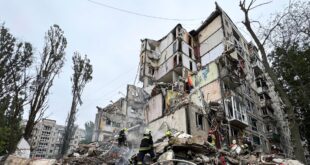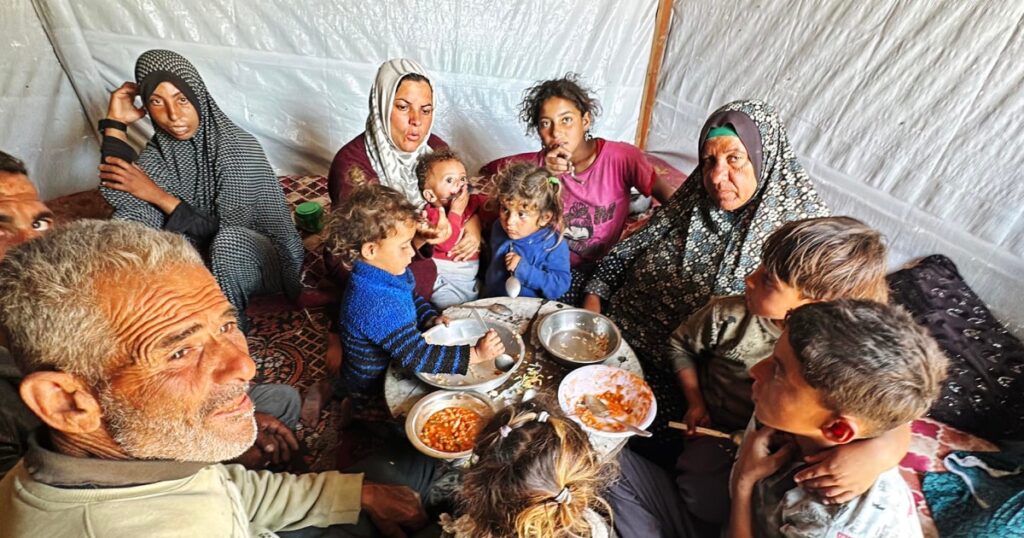
It’s morning in Khan Younis, and the Al-Zurai family wakes up in a tent pitched on the rubble of the cement house they once shared. The tiles that used to be the floor of their home are loosely laid across the sandy ground, marking the space of what is now a makeshift outdoor kitchen.
“Today, God sends us cans, so we’re cooking them for the children,” Suad Al-Zurai, 57, said of the canned beans that she stirs in a simmering pot. It’s the 558th day of the war, and the children, along with the adults, are hungry, covered in dust, haunted by death and facing another day of scraping together a life from the ruins of the Gaza Strip.
NBC News’ crew on the ground spent a day with the Al-Zurai family, from early morning to sunset, to see how they, and thousands of families across the enclave, are living after the ceasefire broke, and Israel began a blockade in early March, barring the entry of food, water, medicine and other supplies into the enclave.
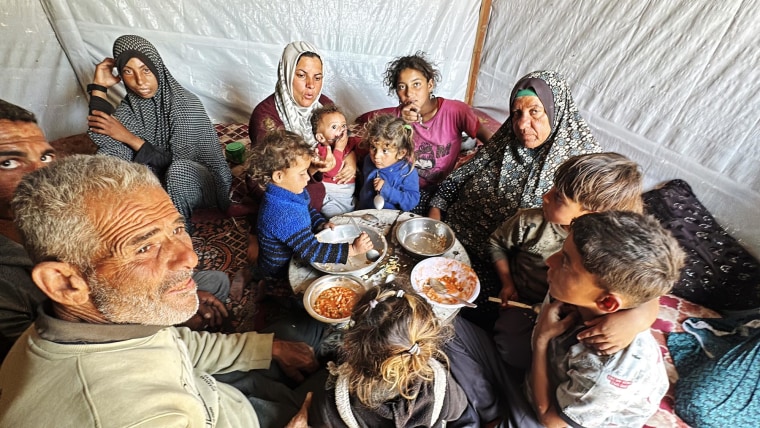
There are 16 members of the Al-Zurai family to share the single pot of beans, eight of them children. At least five more should be there with them, Suad says.
One of her sons was killed along with two of her grandchildren, while another, Khaled Al-Zurai, has been missing for days after an explosion that killed one of his sons. Suad is now taking care of his wife, who has cancer, and their four surviving children. Her third son, Hamed Al-Zurai, and his four children also live with her. Other relatives are displaced to other parts of Gaza.
Suad’s exhaustion is palpable as she stirs the pot under a blazing sun.
For her, enduring survival has begun to feel like death. “We all die one hundred times, every day,” she said, “we die one hundred times daily from fear and horror.”
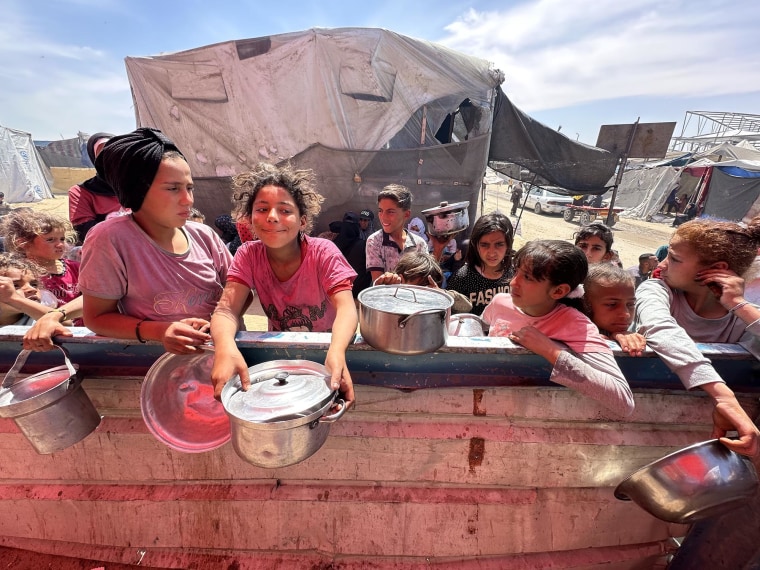
Her slain loved ones are among more than 51,000 people who have been killed in Gaza, including thousands of children, according to the local health ministry, since Israel launched its offensive in the enclave following the Oct. 7, 2023, Hamas-led attacks.
Some 1,200 people were killed during the attacks in southern Israel and around 250 taken hostage, marking a major escalation in a decadeslong conflict.
Throughout the course of the day, worries over food, water and other necessities dominate the family’s discussions, and finding those supplies takes up much of the rest of their time as humanitarian groups warn that aid is running out.
At one point, Hamed Al-Zurai’s 3-year-old daughter, Anwar, throws herself to the floor, crying out for rice, but there isn’t any more to give her.
“My children are constantly crying,” he said. “They want to eat. And I answer them, ‘How? There are no open crossings, so how can I get you food, my love?’”
Before the war, most of the children spent their mornings at school. Now, they dedicate hours each day to trying to find food and water.
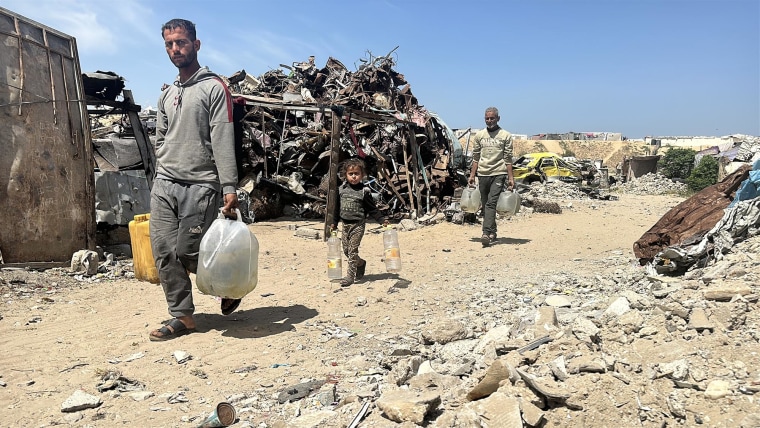
Pushing their fears for their missing father aside, Khaled Al-Zurai’s children, Mohammed, 13, and Suad, 12, dutifully pick up their pots and pans and head to the soup kitchen with their cousin, Shadi, 7, taking NBC News’ crew with them on the roughly 30-minute walk.
At the soup kitchen, there’s already a crowd of other children, along with some women and men, waiting for food under the hot sun. The younger Suad stands with her empty pot in her hands, gazing into the distance, bored and exhausted, as she waits, later joining her brother and sister and sitting in a ditch in the shade before they try again.
On offer is rice — and after waiting for an hour, they fill their pots, carrying it back to their tent.
While they’re getting food, Hamed and young Anwar are out to get water for the family. Anwar walks swiftly as she carries two water jugs, each nearly half the size of her small body.
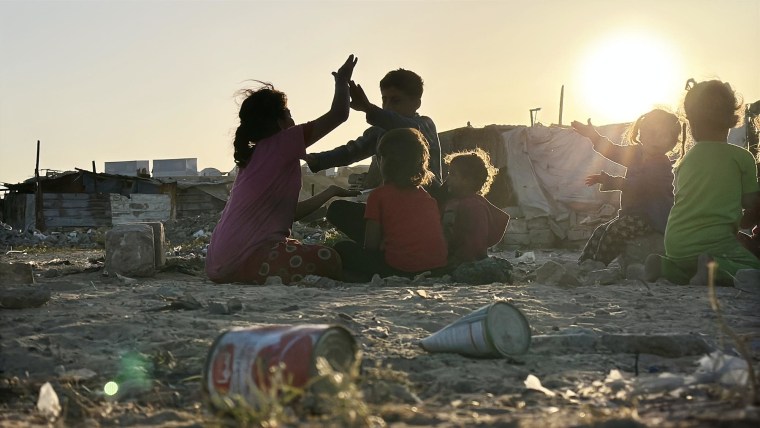
Before the war, Hamed Al-Zurai had a cart and a donkey that he would use to rent out transportation services, but after the donkey died in the war and he lost his cart, he no longer has a way to make money. Unable to buy food or water, the family is left dependent on swiftly dwindling aid.
“The situation is dire,” he said.
But even at a time of incredible darkness, there are moments of light for the Al-Zurais: smiles as they gather together in their tent, finally sharing their hard-won lunch.
After eating, Mohammed gives his younger siblings and cousins old rubber tires to play with. Anwar grins as she wheels one across the sandy ground.
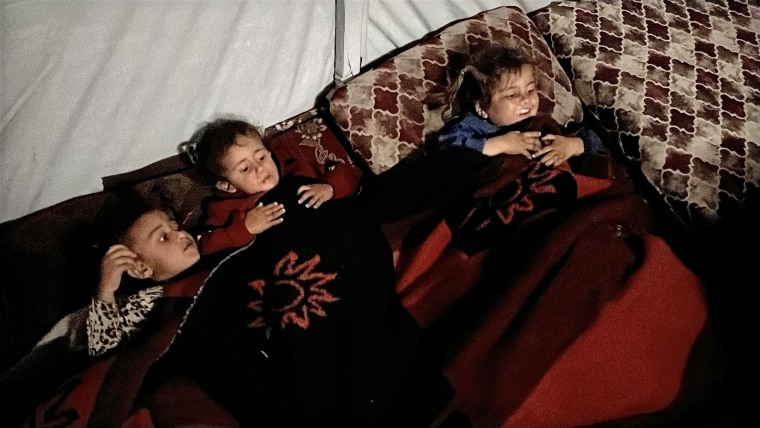
As the sun goes down, the children huddle in a circle outside, laughing as they play hand-clapping games. And for a moment, they look just like any other children anywhere else in the world.
Then, they return to their makeshift tent to eat a meager dinner of more rice and beans, before eventually settling down for bed, huddling together on the ground, wrapped in blankets.
“We hate the nighttime,” Suad Al-Zurai said. And, she added, “the daytime.”
 Latest World Breaking News Online News Portal
Latest World Breaking News Online News Portal





